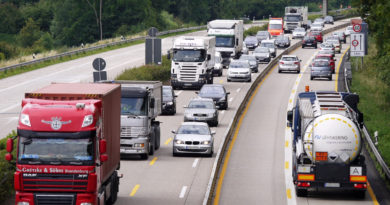Northern Europeans most positive about immigration
The perception and understanding of immigration to Europe varies depending on countries. Northern European states, plus Spain and Portugal, are generally positive, while Central and Eastern Europe and other Mediterranean countries tend to have negative views about it.
The attitudes were revealed in the newly released Eurobarometer survey on the integration of immigrants in the European Union. Little more than half (57%) of the over 28,000 respondents across the EU said they would feel comfortable having social relations (being friends, colleagues, family members, having doctors, neighbours or managers) with residents not originally from their country, while 34% said they would not.
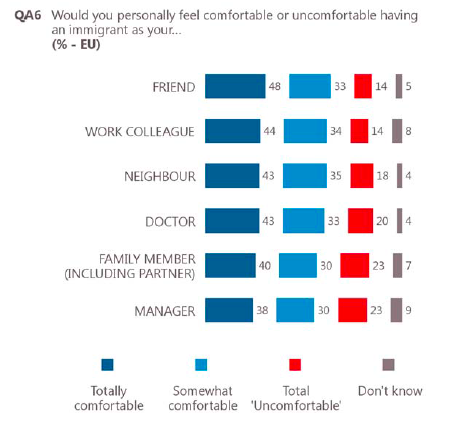
But figures hide major differences across countries. In Spain and Sweden (both 83%), Ireland (80%), the Netherlands and Portugal (both 79%), around eight in ten respondents feel comfortable having any of the explored social relations with an immigrant. In Bulgaria (15%) and Hungary (17%), instead, the situation is dramatically different and the same pattern has been observed in all the relationships considered in the research.
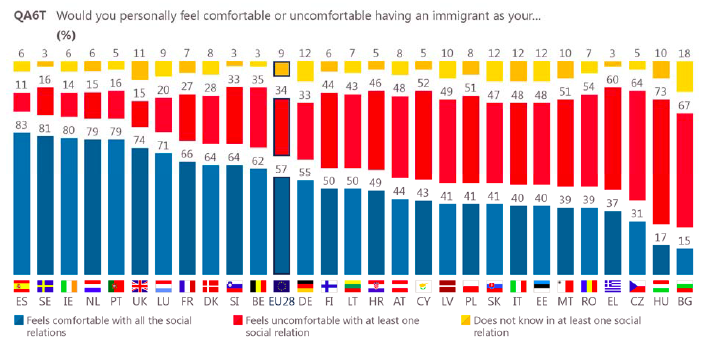
The survey found a link between age, education levels and economic circumstances of respondents and their attitude, with younger, educated and better-off people generally being more open to migration.
Interactions
However, less than half (40%) of respondents said that they have immigrant friends or family members currently residing in their country. Sweden (48%), Spain and Ireland (40%) have the highest proportion, while the percentage is low in Central and Eastern Europe (around 25%). This is not suprising given that in countries like Bulgaria and Romania immigrants are only about 1% of the population, compared with the EU average of 6.9%.
At the EU level, 61% of respondents interact with immigrants at least weekly and 37% daily,
whether it is about exchanging a few words or doing an activity together. The places where interactions are more frequent are the neighbourhood and the workplace. People living in large towns are also more likely to respond positively to this question.
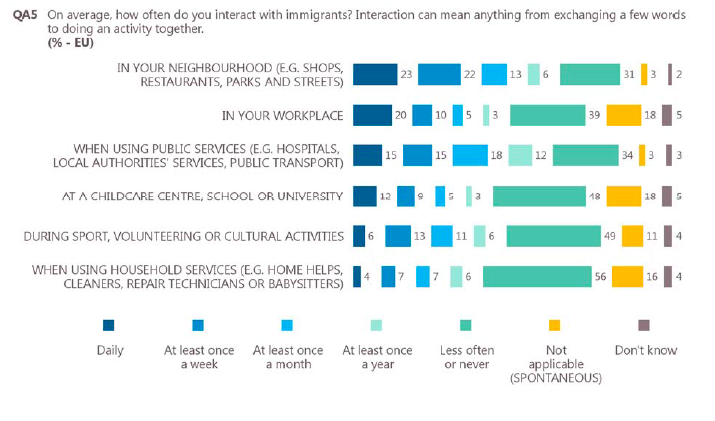
Perceptions
Almost half of people polled (47%) thought there are at least as many illegal immigrants in their country as those legally staying, while 39% said that the proportion of legal immigrants is higher. (In 2016, 984,000 third-country nationals were found to be illegally present in the EU, while 21.6 million were legally resident on 1st January 2017.) Countries on the Mediterranean coast or at the Eastern border of the EU have the most negative views.
Nearly four in ten (38%) Europeans think that immigration from outside the EU is more of a
problem than an opportunity and 31% see it as equally a problem and an opportunity. Once again attitudes are more positive in Northern European states and rather negative in Eastern and Mediterranean countries (with the exceptions of Spain and Portugal.)
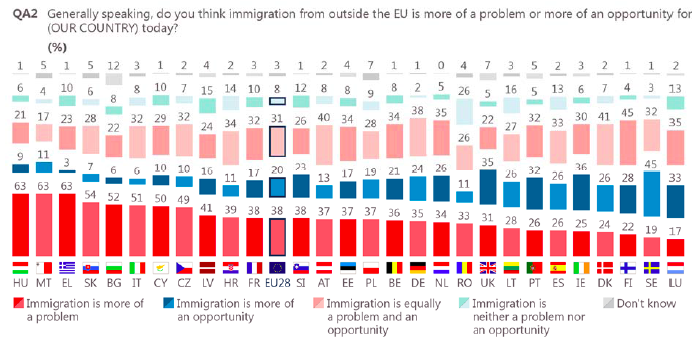
In 16 of the 28 EU countries, less than half of those polled agree that immigrants have a positive effect on the economy. Three countries, however, stand out for a high proportion of people agreeing with this statement: Ireland (72%), the United Kingdom (69%), and Sweden (69%).
A majority of respondents also believe that immigrants are a burden on their country’s welfare system, from 51% in Ireland to 74% in Hungary and 75% in Malta and Greece. In five countries, however, the majority disagree: Luxembourg (66%), France (58%), Spain (52%), Finland and the UK (both 50%).
Integration
Just over half of Europeans say that integration of immigrants is successful, but again this varies widely between states.
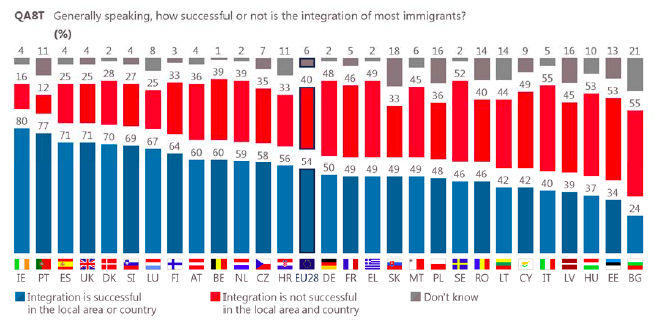
A majority of Europeans think that for integration, it is ‘very important’ that immigrants speak the language of the country they move to (68%), contribute to its welfare system by paying taxes (62%) and are committed to the values and norms of society (56%). Other important factors are having the qualifications and skills to find a job, feeling like a member of the society and having ‘locals’ as friends.
Just over two thirds (68%) think it is important to obtain the citizenship of the host country and 66% believe civic participation (taking part in organisations or local elections) plays a role too.
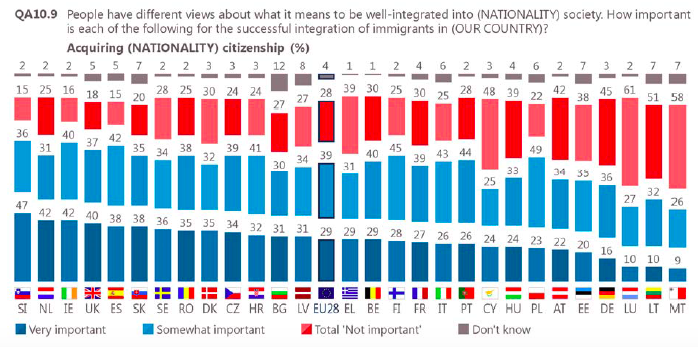
On the other hand, among the obstacles to integration, people see limited efforts by the person to integrate, difficulties finding a job and facing discrimination.
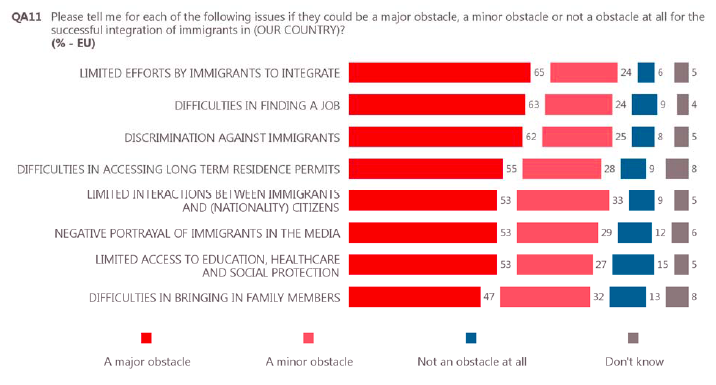
Most respondents in all countries think that difficulties in accessing long term residence
permits could be an obstacle too, and in Portugal, the Netherlands, Greece and Sweden more than 90% hold this view.
While a majority say that not being able to bring along family members could limit integration, the percentage varies from 59% in Estonia to 90% in Portugal and Greece. More than half of respondents also think so in the UK, which has one of the most restrictive laws in Europe in this regard.
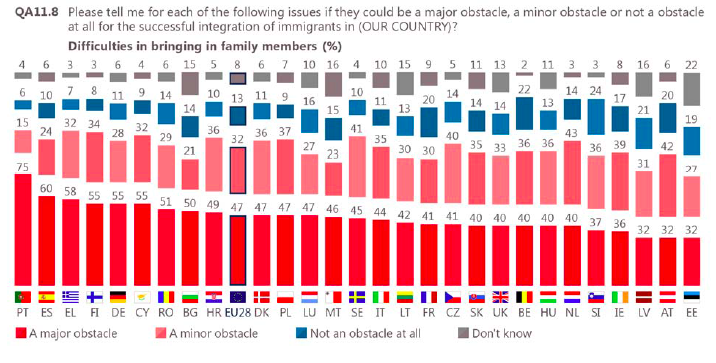
69% of people surveyed believe that fostering integration is a necessary investment for their country and actions that could help include offering language courses upon arrival (88%). Granting the right to vote in local elections is also important, according to the research. Portugal (70%), Sweden (71%), the United Kingdom (72%) Spain (73%) and Ireland (74%) have the highest percentages of those agreeing that extending or maintaining the right to vote in local elections would aid integration.
In all but one state (Hungary), a majority of respondents say that giving everyone the same rights in access to education, healthcare and social protection helps people integrate.
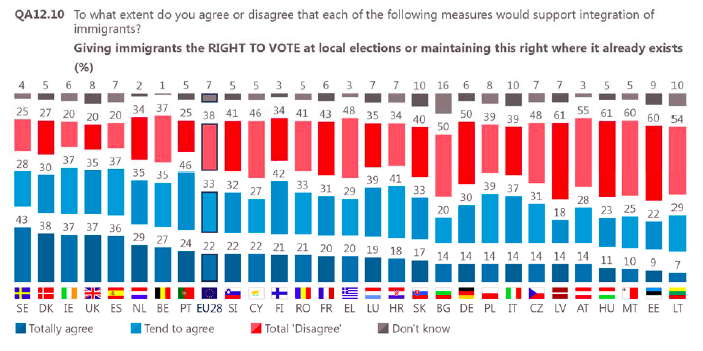
Information
The media play their part too in shaping these attitudes, and the majority of respondents said the way media portray immigrants can be an obstacle to integration. 39% say that the media presentation of immigrants is objective, while 36% say that it is too negative. The highest proportion of those who believe that the media are too negative is the UK (54%), the Netherlands (55%) and Denmark (59%).
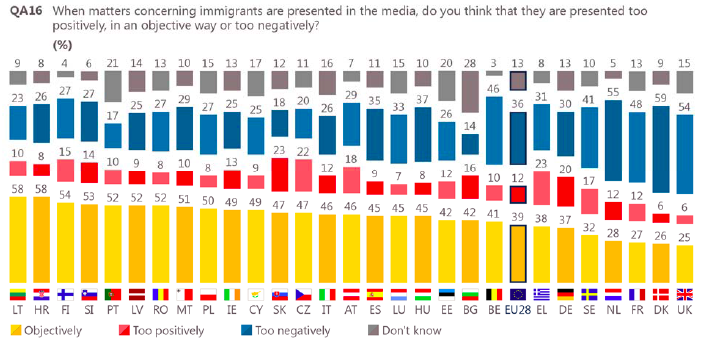
In 23 of the 28 Member States, less than half of those surveyed said that they feel well
informed about immigration and integration matters.
The survey was carried out in October 2017 and included both EU and non-EU citizens.
Claudia Delpero all rights reserved.
Photo via Pixabay.




